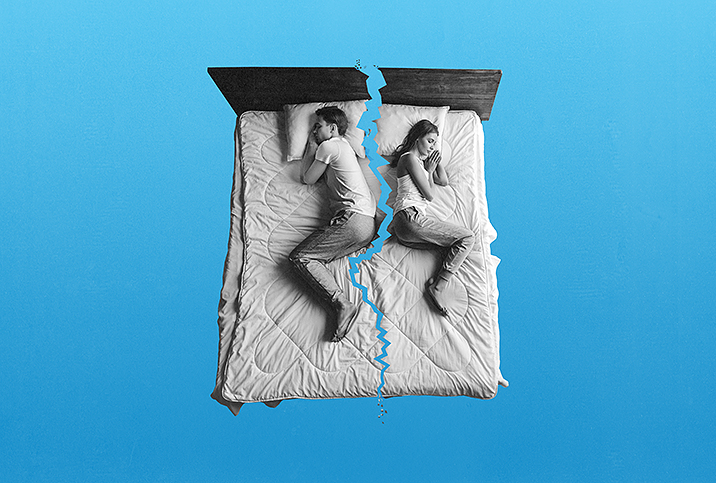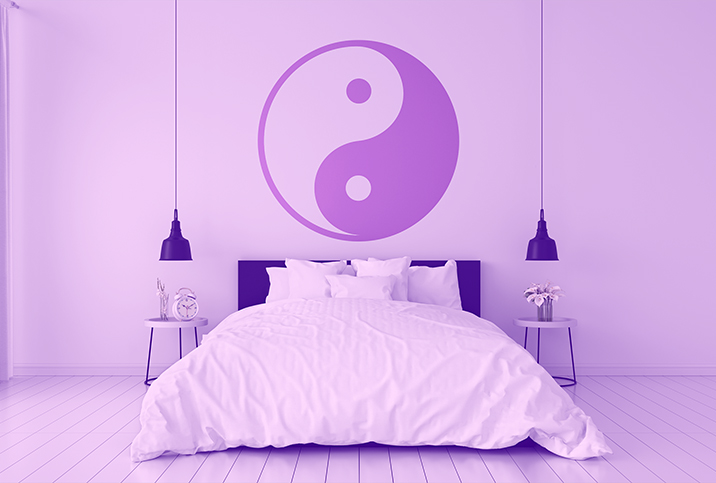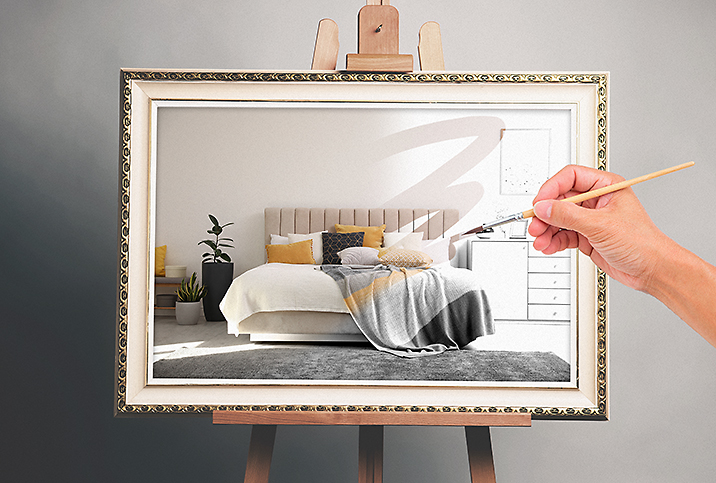Is It Time for a 'Sleep Divorce'?

Many young couples are sleeping in separate rooms, Elite Daily recently reported. Snoring and conflicting schedules are the main reasons couples are sleeping separately, the New York Times discovered. Sleeping apart may help your relationship and even provide health benefits.
Having two separate bedrooms might seem like a luxury in this economy. But if couples decide to sleep separately, what could that do to their marriage?
One in 5 couples sleep in separate bedrooms and 22 percent of these couples made this decision (known as a "sleep divorce") in 2022, which means this sleeping arrangement is trending up, according to a January 2023 survey of 2,200 Americans conducted by the International Housewares Association.
Did couples always share a bed?
In medieval times, most families couldn't afford to have more than one bed and needed to sleep together for warmth. During Victorian times, separate beds were considered the healthiest way to sleep as doctors believed that sharing a bed could spread disease and cause the weaker sleeper to drain the vitality from the stronger partner.
In the 1950s, separate beds were considered a cultural sign of a failing marriage. Yet you couldn't show a couple sharing a bed on TV, which is why even Lucille Ball and Desi Arnaz—who were married in real life—were depicted on-screen sleeping in twin beds for six seasons of "I Love Lucy."
For history buffs out there, a couple sleeping in the same bed was first shown on the "Mary Kay and Johnny" sitcom in 1947, but no one remembers that show. Next up were the animated Fred and Wilma Flintstone in the early 1960s, but it wasn't until "The Munsters," "The Addams Family" and "Bewitched" in 1964 that the trend started with live actors. After that came the couples on "Green Acres" and "The Brady Bunch" in 1965 and 1969, respectively
From Windsor Castle to the White House to Hollywood
In England, it wasn't just separate beds; the upper class actually enjoyed separate rooms, which was considered a sign of wealth. For instance, Queen Elizabeth II and Prince Philip had separate royal bed chambers in their assortment of castles and other royal homes.
Traditionally, the same was true in the White House until President Gerald Ford and first lady Betty Ford chose to sleep in the same bed. Most recently, however, former President Donald Trump turned back time by having not only separate bedrooms for he and the first lady but also separate floors.
Before "normies" began opening up about sleeping separately, celebrity couples were already doing it, from still-together couples such as Matthew Broderick and Sarah Jessica Parker to Gwyneth Paltrow and Brad Falchuck to David and Victoria Beckham—who have separate wings.
Then there are the celebrity couples who slept separately and are no longer together, such as Angelina Jolie and Brad Pitt, Tim Burton and Helena Bonham Carter, and Kourtney Kardashian and Scott Disick.
Sleeping separately can be the first sign it's over
Christopher, who requested his last name not be used, first started sleeping in the guest room because of back issues and his preference for sleeping at a colder temperature than his partner Doug preferred.
"It was out of necessity but it helped to illustrate that our relationship wasn't romantic in nature and we were forcing that on ourselves, and it opened up a bigger conversation," revealed Christopher, who lives in Los Angeles.
Six months after Christopher began sleeping in the guest room, his relationship with Doug was over.
When a sleep divorce turns into an actual divorce
As Christopher's story shows, separate bedrooms can be a clear signal of trouble for a couple.
"From a divorce perspective, I find it concerning when couples are sleeping in separate bedrooms as it is usually a red flag during a consultation that divorce will likely follow," said Nicole Sodoma, a divorce attorney in Charlotte, North Carolina, and the author of "Please Don't Say You're Sorry." "Even the simple statement, 'We've been roommates for years,' will alert me that something needs to change in their relationship in order for it to have long-term success.
"I have heard that sleeping separately is one of the changes couples experience before separation and divorce," she added. "In fact, some couples have lived in separate bedrooms for years before deciding to legally separate and divorce."
For Emme Witt, the decision to sleep in a separate bed from her husband was the beginning of the end of her marriage.
"A lot of it had to do with the birth of our children," said Witt, a sex expert in Los Angeles who also has written for Giddy. "I was getting up throughout the night to care for them. I became sleep deprived. I started letting my youngest sleep in the bed with my husband and me just so I could get some sleep. Our marriage bed was no longer for intimacy. My husband snored and kept me awake, and our son moved around a lot. I started to sleep in the guest bedroom. But I think that just led to my husband and me drifting apart."
Gradually, over time, this sleeping arrangement led to Witt and her husband drifting apart emotionally.
"Night after night of sleeping apart, we were robbed of the intimate experience of sharing the same bed. This eventually created a wall between myself and my husband," she said. "There was no more cuddling in bed, no more snuggling as we fell asleep, no more waking up in each other's arms. This got in the way of our connection. We eventually became like roommates. It hurt our relationship."
Distance in bed can lead to distance in your head
Sharing a bed with someone you love and with whom you share a solid, committed relationship leads to improved sleep quality and a better night's rest for women, suggested a 2010 study published by the Sleep Research Society.
Perhaps this finding revolves around the peace of mind you get from sleeping next to your partner, as sleeping apart can cause a distance in your relationship, explained Lisa Lawless, Ph.D., a clinical psychotherapist and the CEO of Holistic Wisdom, a sexual wellness brand based in Bend, Oregon.
"Many couples enjoy their own space and have less disrupted sleep, but some find it can increase feelings of loneliness and isolation," she explained. "There can be decreased intimacy, physical connection and less time for bonding and sharing experiences. This can also increase difficulty in resolving conflicts and cause communication challenges, especially if a couple already has distance or tension."
Joe Feminella, of Los Angeles, founder of the dating app FROME (First Round's On Me), added that being in the proximity of your loved one can be beneficial.
"If you or your partner really needs physical touch or extra quality time, I think sleeping in the same bed is very important," he said.
Sleeping apart makes it easier to cheat
It's easier to cheat on your partner if you're sleeping separately and your relationship is already on unsteady ground, Lawless said.
"If couples are experiencing challenges in a relationship, it can induce feelings of distrust and even open up opportunities for infidelity…in online activities through social media, chat rooms and even dating sites," she added. "Partners can more easily conceal online infidelity and participate in activities they may not have if they had been sleeping in the same room."
Amanda Phillips, a mental health awareness author and founder of TheMentalDesk.com, based in Chicago, said choosing not to sleep in the same bed can erode commitment for some partners.
"Sleeping apart can also lead to a reduction in the sense of commitment in a relationship, as the physical separation can suggest that the relationship is not as strong as it used to be," Phillips said.
Sleeping separately can remove intimacy
"Sharing a bed creates intimacy," said Jacqueline Fae, a relationship expert and the CEO and founder of IDL Match Club, a matchmaker site based in South Florida. "Cuddling can actually be more romantic than sex. When you hold someone in your arms, it creates love. When you remove that from a relationship, you remove some of that intimacy from the relationship. Even if you're still having sex, taking that away can make it hard on a couple."
Speaking of sex, you might be having less of it if you don't share a bed.
"I think a big downside [of not sharing a bed] for me is not having the opportunity for very organic or spontaneous sex," Feminella said. "If you and your partner both know that at some point you are going to head off into your own bed, it either creates a timeline expectation of 'I need to make a move before it's too late,' which creates some type of pressure, or there can be disappointment because one person can be very in the mood but the other has already started the process of heading to their bed."
Maybe you haven't found the one—for sharing a bed
When Feminella was dating, he used to have a strict no-sleepover policy, which he said may or may not have had something to do with the size of his bed.
"I really enjoyed my sleep. Most of the time, there was no real connection," Feminella said. "I usually had to be up very early, I was probably self-conscious of my snoring and was embarrassed, or maybe it was really none of those things and it was all just because I had a twin bed, but I do remember that I thoroughly enjoyed sleeping alone and I didn't think anyone can change that."
Then Feminella started dating his now-fiancée and all that changed.
"I was hesitant to sleep over the first few times we slept together because of all those past thoughts, but to my pleasant surprise, it couldn't have felt more easy and more comfortable," he said. "For me, it was about finding someone I actually wanted to sleep next to, someone I was comfortable being my true self around when I was sleeping. It also helped that she has a nice queen-sized bed, so we had some room."
Fighting to share a bed
After sleeping separately, Witt said she tried to save her marriage with date nights and sex therapy, only to realize there were so many other issues outside of the bedroom in her marriage.
"The fact that we didn't sleep together in the same bed was just another thing to drive us apart from one another," she added.
Today, Witt has been with a new partner for seven years. He sometimes snores, keeping her up at night and tempting her to crash on the couch. But she always stops herself because of what happened in her past marriage.
"I think that deciding to sleep apart was an act of giving up," Witt explained. "It was like announcing that I wasn't going to try hard for that relationship anymore; that I was breaking apart emotionally from my husband. And I just refuse to do that with my current partner. I want to stay connected at any cost. I mean, obviously, not at any cost; our relationship is really healthy. But I want to continue to create the passion and connection in an intentional manner and not just let a little snoring get in the way."
Should you get a sleep divorce?
"If couples choose to sleep in separate bedrooms, they should maintain open and honest communication to reduce the potential of online infidelity," Lawless said. "They should also prioritize spending time with one another before going to sleep to ensure they still have time to bond and enjoy intimacy."
Phillips said the decision to sleep together or apart is a personal choice that can depend on many factors.
"It's important for couples to have open and honest discussions about their sleep preferences and the need to find a solution that works for both partners," Phillips said.
Witt said a sleep divorce can work, but it takes emotional maturity.
"It takes a couple who understands that intimate connection is necessary," Witt said. "But then again, that's a sort of couple that will have a relationship that is successful anyway. If they have that kind of relationship, then sleeping separately isn't such a big deal."


















